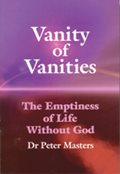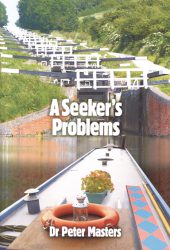
Presents the experience of King Solomon, who experimented with every conceivable kind of pleasure, and concluded that life is pointless and predictable, unless people seek and find the Lord God, and know His power and guidance in their lives.
Extract
Solomon’s great experiment
Nearly three thousand years ago a remarkable preaching king penned some of the most disturbing and soul-searching sentences in the Bible. They occur right at the beginning of the book of Ecclesiastes. (The word Ecclesiastes means ‘the preacher’.) Practically everyone reading these pages will have heard them at some time. He wrote – ‘The words of the Preacher, the son of David, king in Jerusalem. Vanity of vanities, saith the Preacher, vanity of vanities; all is vanity.’
What are we to make of these words? The most important issue before every one of us is to understand life’s purpose and destiny. These words, and the passage following, help us. We should not ignore them, like those who rush through their entire lives without a single serious thought about its meaning.
The Preacher – as the royal author chooses to sign himself – ranks as a genius by any standards. His massive intellect and literary powers have placed him among the foremost figures of history. But we are not just listening to an outstanding man, for in these words the preacher is speaking under the inspiration of God, and every word is meant for our souls.
The purpose of the book of Ecclesiastes is to point out the total inadequacy of confining all our attention to the material or non-spiritual aspects of life. It is to demonstrate that there can be no lasting happiness, no fulfilment, and no ultimate purpose in a life lived without God. And the preacher proves his case with a series of striking illustrations.
If a simple shepherd had written these things, we might suppose that there were many pleasures and experiences to which he had no access. But this preacher was Solomon, ‘the son of David, king in Jerusalem’. He had vast wealth. He had every opportunity to indulge himself to his heart’s desire. And this he did, exploring every available facet of science, craft and pleasure. Before his conversion to God he tried every imaginable recipe for happiness, experimenting with almost anything that excited him mentally and bodily, including even mindless folly. But later, he looked back over the years and pronounced this verdict on it all – ‘Vanity of vanities!’
What did he mean by vanity? Today, this word is mostly used to describe pride and ostentation. But here it means emptiness or pointlessness. It refers to things that are insubstantial and passing. Take God out of life, and ‘all is futility’ (as one Bible translation puts it).
We may say, ‘Well, that was his experience, but mine will be different. There are many things which excite me and which I intend to get involved in. There is tremendous potential in life. I have much to do, learn and discover, and I aim to make my life full and satisfying.’ But Solomon urges us to think this through, using many persuasive arguments. Of these, we shall glance at three.














